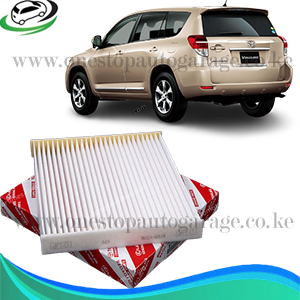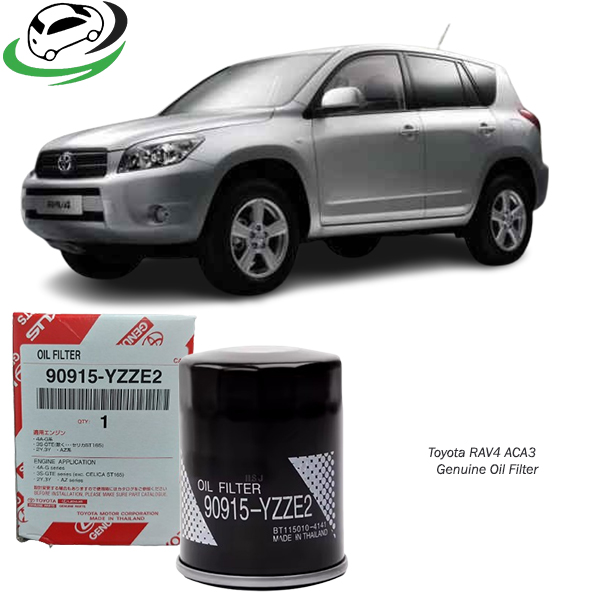-20%
Get Toyota RAV4 ACA3 Genuine Oil Filter 90915-YZZE2 in Kenya
An oil filter is a crucial component in a vehicle’s engine, designed to maintain oil cleanliness by trapping contaminants and particles that could otherwise circulate through the engine. Using a genuine oil filter is essential to ensuring high performance, durability, and efficiency. Unlike generic or counterfeit options, a genuine oil filter is manufactured to meet or exceed the specifications set by the original equipment manufacturer (OEM), providing a reliable fit and superior filtration capabilities. This article explores the purpose, structure, types, advantages, maintenance tips, and signs of wear associated with genuine oil filters.
1. Purpose of an Oil Filter
The oil filter’s primary purpose is to remove impurities from the engine oil. Engine oil is crucial for lubricating moving parts, reducing friction, and cooling the engine. As the oil circulates, it collects dust, metal shavings, and other contaminants. Over time, if these impurities are not filtered out, they can cause:
- Increased Friction and Wear: Particles in the oil increase friction among engine parts, accelerating wear and shortening engine life.
- Reduced Oil Efficiency: Contaminants can reduce oil’s lubricating properties, impairing its ability to reduce heat and friction.
- Engine Clogging and Damage: In severe cases, unfiltered oil can clog engine passages, leading to overheating and potential engine failure.
Using a genuine oil filter guarantees optimal filtration, which keeps oil clean, supports better performance, and extends engine life.
2. Structure and Functioning of a Genuine Oil Filter
A genuine oil filter consists of several components engineered for precise filtration:
- Filter Media: The core of an oil filter, filter media is typically made from cellulose, synthetic fibers, or a blend of both. It traps contaminants while allowing oil to pass through efficiently. Genuine filters use high-quality media with a dense but permeable structure, enabling them to capture even microscopic particles.
- Anti-Drain Back Valve: This valve prevents oil from draining out of the filter and back into the engine when the engine is off, ensuring that oil is available immediately upon startup.
- Relief (Bypass) Valve: In conditions of extreme cold or when the filter is clogged, this valve opens, allowing oil to bypass the filter to prevent oil starvation and maintain engine lubrication.
- End Discs and Center Tube: These components provide structural stability to the filter. The center tube maintains the shape of the filter media, while end discs prevent unfiltered oil from leaking through the ends of the filter.
- Filter Canister: The outer metal shell protects the internal components of the filter from damage. Genuine oil filters use high-grade metal canisters that withstand pressure changes and resist corrosion.
As oil flows through the filter, the filter media captures contaminants, leaving the oil cleaner before it returns to lubricate the engine components.
3. Types of Genuine Oil Filters
Oil filters come in several types, each with its own unique design and application. Here are some common types of oil filters:
- Primary (Full-Flow) Filters: Most commonly used in vehicles, these filters allow oil to flow through the engine while removing contaminants. They are engineered to handle high oil flow and are essential for day-to-day driving conditions.
- Secondary (Bypass) Filters: These are supplemental filters that remove even smaller particles than full-flow filters, providing finer filtration. They work in tandem with primary filters but are not common in everyday vehicles.
- Spin-On and Cartridge Filters: Spin-on filters are self-contained, with the filter media, valves, and canister in one replaceable unit. Cartridge filters require only the filter element to be replaced and are housed in a permanent canister.
- Magnetic Oil Filters: These filters use magnets to capture metal shavings and other ferrous particles, which can be particularly useful for engines that operate under heavy loads.
Using a genuine oil filter of the correct type and fit ensures compatibility with the engine’s requirements and performance specifications.
4. Advantages of Using a Genuine Oil Filter
A genuine oil filter offers multiple benefits over aftermarket or counterfeit filters:
- Optimal Filtration Efficiency: Genuine filters are designed to trap up to 99% of harmful particles, providing effective filtration that supports engine longevity.
- Durability and Reliability: Made with quality materials, genuine filters are highly durable and less prone to damage under high pressure and extreme temperatures.
- Perfect Fit and Compatibility: Designed to meet OEM specifications, genuine filters fit perfectly, eliminating any risks of oil leakage or improper filtration due to poor fit.
- Consistent Performance: Unlike counterfeit filters, which may degrade quickly, genuine filters maintain consistent performance across the filter’s lifespan, contributing to more stable engine performance.
- Longer Engine Life: Genuine filters keep oil cleaner for longer, reducing engine wear, minimizing sludge buildup, and extending engine life.
- Warranty Protection: In some cases, using non-genuine parts can void vehicle warranties. Using a genuine filter helps maintain warranty protection, as it adheres to the manufacturer’s standards.
5. Signs of a Worn-Out Oil Filter
Recognizing the signs of a worn or clogged oil filter can help you replace it before it impacts engine performance. Common symptoms include:
- Poor Engine Performance: A clogged filter restricts oil flow, leading to sluggish engine performance and potentially overheating.
- Metallic or Rattling Noises: Insufficient oil flow due to a clogged filter can lead to increased friction, which may cause rattling noises in the engine.
- Low Oil Pressure: A dirty filter can cause a drop in oil pressure, which may be indicated by the oil pressure gauge or dashboard warning lights.
- Dirty Exhaust: In severe cases, a clogged oil filter can lead to black or dark exhaust smoke, signaling poor filtration and potential engine strain.
- Increased Fuel Consumption: A clogged filter makes the engine work harder, which can increase fuel consumption.
It’s recommended to inspect and replace the oil filter as part of routine maintenance to prevent these symptoms.
6. Maintenance Tips for Genuine Oil Filters
Proper maintenance of the oil filter involves regular checks and timely replacements:
- Follow the Manufacturer’s Guidelines: Check the owner’s manual for recommended oil filter change intervals, which are typically between 5,000 to 10,000 miles, depending on the vehicle and driving conditions.
- Inspect During Oil Changes: Many vehicle owners replace the oil filter with each oil change. This routine ensures that new oil remains clean and that the filter is functioning at its best.
- Use Quality Oil: High-quality engine oil works well with genuine filters and prevents contaminants from accumulating as quickly. Using the right oil grade also reduces stress on the filter.
- Check for Leaks: After installing a new filter, always check for leaks. A loose or improperly fitted filter can cause oil to leak, potentially harming the engine.
- Dispose of Used Filters Properly: Used oil filters contain contaminants and residual oil, so they should be disposed of properly at a recycling center or through an authorized disposal service.
By following these maintenance tips, you can help the genuine oil filter perform efficiently, contributing to your vehicle’s overall health.
7. Differences Between Genuine and Counterfeit Oil Filters
While counterfeit oil filters are often cheaper, they come with substantial risks:
- Poor Filtration: Counterfeit filters are typically made with low-grade filter media that fails to capture smaller particles, compromising engine protection.
- Weak Structural Integrity: Counterfeit filters may use subpar materials for the canister, valves, and seals, making them prone to rupture under high pressure or extreme temperatures.
- Reduced Lifespan: Genuine filters are tested for durability and consistency, while counterfeit filters degrade quickly, leading to more frequent replacements.
- Potential for Engine Damage: Inadequate filtration and fit can lead to oil starvation, clogging, or leakage, all of which can cause severe engine damage and costly repairs.
8. Cost Considerations of Genuine Oil Filters
While genuine oil filters are more expensive than generic or counterfeit options, they offer better value in the long term. By reducing wear and extending engine life, genuine filters minimize the risk of costly engine repairs or replacements. Additionally, the use of genuine filters may be required to maintain a vehicle’s warranty, potentially saving on warranty-covered repairs.
Conclusion
A genuine oil filter is essential for maintaining engine health and performance. Designed to meet or exceed OEM standards, a genuine filter provides optimal filtration, durability, and reliability, ensuring that your engine oil remains clean and that contaminants are effectively trapped. Regular maintenance and timely replacement of the oil filter prevent potential engine issues, enhance fuel efficiency, and extend engine lifespan. While genuine filters may cost more than generic or counterfeit options, their benefits in terms of performance, protection, and long-term savings make them a valuable investment for any vehicle owner. By choosing a genuine oil filter, you’re taking an important step in safeguarding your engine’s health and ensuring a smooth, reliable driving experience.
Follow us on Facebook for more parts.



